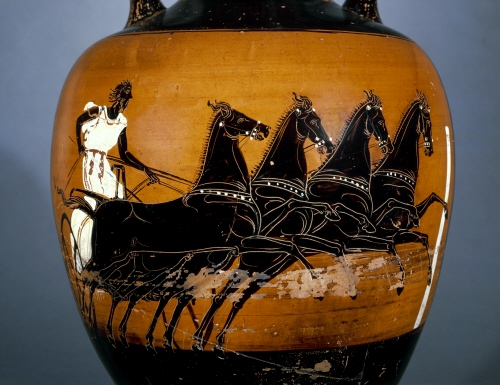Suppose that we hear a noise emitted by some material body. The sound begins and we continue to hear it. It goes on until finally it ceases. Then there is silence. The sound has passed and is no longer sound. Before it began it was future and could not be measured, because it did not yet exist. Now that it has ceased it cannot be measured, because it no longer exists. It could only be measured while it lasted, because then it existed and could be measured. But even then it was not static, because it was transient, moving continually toward the point when it would no longer exist. Was it all the more measurable because of this fact? While it was transient it was gaining some extent in time by which it could be measured, but not in present time, for the present has no extent.
Augustine of Hippo, Confessions XI, 27 (written c. 398), English translation by R. S. Pine-Coffin
Und als der blutige Kampf begonnen
Und die Ebne vom Mordgeschrei widerhallt,
So ruft er verzweifelnd: "Es naht mit Gewalt,
Was mir die untrügliche Parce gesponnen;
Doch wogt in der Brust mir ein göttliches Blut,
Drum will ich auch wert des Erzeugers verderben!"
Und wandte die Rosse auf Leben und Sterben,
Und jagt zu des Stromes hochbrausender Flut.
Wild schnauben die Rosse, laut rasselt der Wagen,
Das Stampfen der Hufe zermalmet die Bahn.
Und schneller und schneller noch rast es heran,
Als gält' es die flüchtige Zeit zu erjagen.
And when the bloody battle had begun,
And the plains were echoing with murderous cries,
He called out in despair, "It is approaching with power,
As spun for me by the infallible Fates.
But a divine blood is flowing in my breast,
And so, worthy of the one who sired me, I also shall perish."
And he turned the horses to life and death,
And drove them into the foaming, flooding waters of the river.
The stallions snort wildly, the chariot rattles noisily,
The stamping of hooves crushes the roadway.
Faster and still faster it continues to race on,
As if in pursuit of fleeting time.
Körner, Amphiaraos D 166
Thus dies Amphiaraos before the gates of Thebes, ‘as if in pursuit of fleeting time’. As Augustine pointed out in his discussion in ‘Confessions’, time is somehow never present. It is always coming out of the ungraspable past and racing away into a non-existent future. It is always in transit, transient, fleeting (or perhaps fleeing or flying off).


Körner uses the term ‘flüchtig’ here to capture the astonishing speed at which Amphiaraos goes towards his pre-ordained doom. It does not take long to realise, though, that we are all in the same chariot, similarly hurtling towards annihilation. As Macbeth put it:
Life's but a walking shadow, a poor player,
That struts and frets his hour upon the stage,
And then is heard no more.
When Schiller was asked what had happened to one of the characters from his Wallenstein trilogy, he wrote ‘Thekla, eine Geisterstimme’ (‘Thekla, the voice of a spirit’), the voice of a ‘fleeting shade’ or ‘shadow’.
Wo ich sei und wo mich hingewendet,
Als mein flücht'ger Schatte dir entschwebt?
You ask where I am and where I went
When my fleeting shade disappeared.
Schiller, Thekla (eine Geisterstimme) D 73, D 595
Her disembodied words echo Schiller’s own conviction of the inherent value of moral action even within the transient hurly burly of human history.
Wage du zu irren und zu träumen,
Hoher Sinn liegt oft in kind'schem Spiel.
Dare to stray and to dream.
There is often a high meaning in childish play.
Schiller, Thekla (eine Geisterstimme) D 73, D 595
In a more complex poem written in the same year as Thekla (1802), Schiller created the voice of a minstrel or bard who tried to find a meaningful pattern within the tumultuous flow of human history: Die vier Weltalter (The four ages of the world), Schubert’s D 391.
Und wie der erfindende Sohn des Zeus
Auf des Schildes einfachem Runde
Die Erde, das Meer und den Sternenkreis
Gebildet mit göttlicher Kunde,
So drückt er ein Bild des unendlichen All
In des Augenblicks flüchtig verrauschenden Schall.
And just as the inventive son of Zeus took
The simple circle of the shield and on it presented
The earth, the sea and the circle of the stars,
Portraying them with divine art,
So he (the singer) prints an image of the everlasting All
In the fleeting, dying sound of the moment.
We are reminded of Faust’s attempt (in Part Two of Goethe’s play) to attain enlightenment and universal perception in a supreme ‘moment’ (Augenblick, literally the blinking of an eye).
One of the turning points in world history, according to this poem, is the move from the Classical to the Christian world, which allowed inner forces (love and rational thought) to be valued more than external objects and impressions. Thus, ‘the fleeting pleasures of the senses were banished.’
Die Götter sanken vom Himmelsthron,
Es stürzten die herrlichen Säulen,
Und geboren wurde der Jungfrau Sohn,
Die Gebrechen der Erde zu heilen,
Verbannt ward der Sinne flüchtige Lust,
Und der Mensch griff denkend in seine Brust.
The gods sank from heaven's throne,
The mighty columns fell,
And the Virgin's son was born
To heal the affliction of the earth.
The fleeting pleasures of the senses were banished
And humans clasped thinking to their breasts.
Schiller, Die vier Weltalter D 391
☙
Descendant of:
TIMETexts with this theme:
- Thekla (eine Geisterstimme), D 73, D 595 (Friedrich von Schiller)
- Amphiaraos, D 166 (Theodor Körner)
- Die vier Weltalter, D 391 (Friedrich von Schiller)


